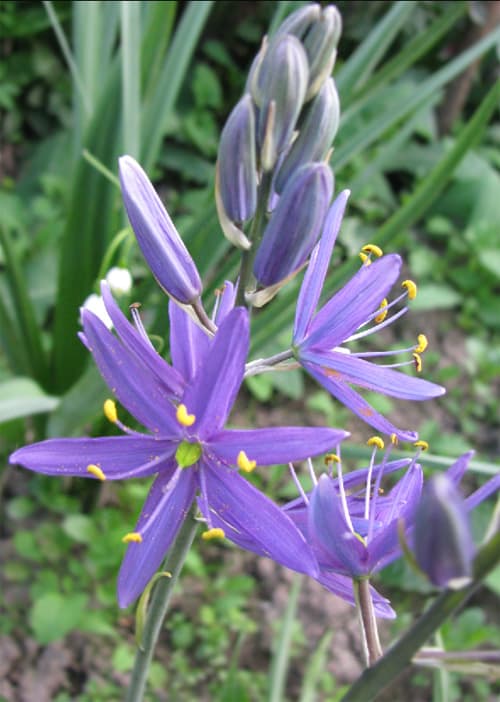Your shopping cart is empty!
Small camas (quamash)
Small camas - Camassia quamash.
It grows in mountain meadows mainly in the taiga zone of western Canada and the USA. From British Columbia and Montana to Utah and California.
The bulb is broadly ovoid or spherical, 1-5 cm in diameter, black or brown. The bulb is edible.
The raceme is 10-20 cm long, bears up to 35 flowers.
The flowers are blue-violet, blue or white (both occur in the same inflorescence).
Winter hardiness zones: Z4-Z7.
Plant height: 60-80 cm.
1.0 g = 200 seeds.
In culture since 1827.
Care.
Camassias are quite unpretentious; for planting it is advisable to choose areas in the sun or light shade. Prefers fertile soils with normal moisture conditions, clay and loamy soils. In early spring, plants are fed in the snow with complete mineral fertilizer. Water only during dry periods.
In autumn, it is advisable to additionally mulch the plantings with peat.
Usage.
Camassias look good in mixed borders and on lawns. Camassia inflorescences are great for cutting; they can become the basis of an elegant bouquet, suitable for any interior - from classic to avant-garde. Camassias pair well with yellow, orange and purple flowers.
Partner plants are spring-flowering perennials: tulips, daffodils, scylla and hyacinths.
The flowers bloom gradually, starting from the bottom of the peduncle. This beautiful plant should be planted where it will not have to be disturbed - then the flowering will be more magnificent. Dividing the bulbs is carried out every two to three years. This is done at the very beginning of autumn, when the leaves turn yellow. The plant is dug up carefully, trying not to damage the roots, and the daughter bulbs are separated. For planting, choose open sunny places, but camassia also grows well in partial shade. The distance between the bulbs is 10-15 cm, the planting depth is 10-15 cm. Camassia, like all bulbs, does not tolerate waterlogging of the soil and stagnation of water. She is beautiful in rocky gardens and rock gardens. Looks very good against the background of conifers. It tolerates harsh winters without problems, but it is better to do light mulching. Not damaged by pests.
Camassia can also be propagated by seeds. After flowering, a seed capsule with 5-10 black seeds is formed. They should be sown directly into the ground. But the seedlings will bloom in the 3-4th year.
It grows in mountain meadows mainly in the taiga zone of western Canada and the USA. From British Columbia and Montana to Utah and California.
The bulb is broadly ovoid or spherical, 1-5 cm in diameter, black or brown. The bulb is edible.
The raceme is 10-20 cm long, bears up to 35 flowers.
The flowers are blue-violet, blue or white (both occur in the same inflorescence).
Winter hardiness zones: Z4-Z7.
Plant height: 60-80 cm.
1.0 g = 200 seeds.
In culture since 1827.
Care.
Camassias are quite unpretentious; for planting it is advisable to choose areas in the sun or light shade. Prefers fertile soils with normal moisture conditions, clay and loamy soils. In early spring, plants are fed in the snow with complete mineral fertilizer. Water only during dry periods.
In autumn, it is advisable to additionally mulch the plantings with peat.
Usage.
Camassias look good in mixed borders and on lawns. Camassia inflorescences are great for cutting; they can become the basis of an elegant bouquet, suitable for any interior - from classic to avant-garde. Camassias pair well with yellow, orange and purple flowers.
Partner plants are spring-flowering perennials: tulips, daffodils, scylla and hyacinths.
The flowers bloom gradually, starting from the bottom of the peduncle. This beautiful plant should be planted where it will not have to be disturbed - then the flowering will be more magnificent. Dividing the bulbs is carried out every two to three years. This is done at the very beginning of autumn, when the leaves turn yellow. The plant is dug up carefully, trying not to damage the roots, and the daughter bulbs are separated. For planting, choose open sunny places, but camassia also grows well in partial shade. The distance between the bulbs is 10-15 cm, the planting depth is 10-15 cm. Camassia, like all bulbs, does not tolerate waterlogging of the soil and stagnation of water. She is beautiful in rocky gardens and rock gardens. Looks very good against the background of conifers. It tolerates harsh winters without problems, but it is better to do light mulching. Not damaged by pests.
Camassia can also be propagated by seeds. After flowering, a seed capsule with 5-10 black seeds is formed. They should be sown directly into the ground. But the seedlings will bloom in the 3-4th year.

Small camas, common camas, quamash. Bot. syn.: Phalangium quamash Pursh, Quamasia azurea Heller, Quamasia walpolei Piper, Сamassia esculenta.















